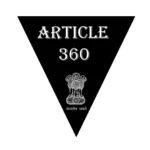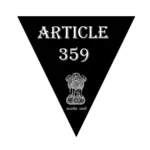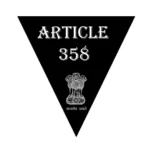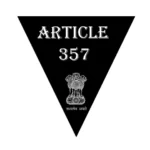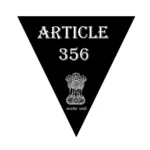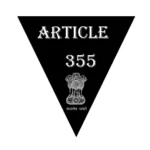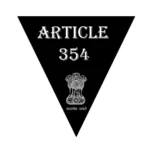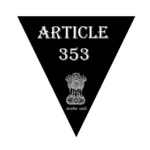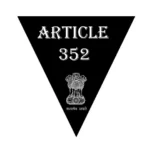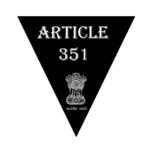यह लेख Article 163 (अनुच्छेद 163) का यथारूप संकलन है। आप इस मूल अनुच्छेद का हिन्दी और इंग्लिश दोनों संस्करण पढ़ सकते हैं। आप इसे अच्छी तरह से समझ सके इसीलिए इसकी व्याख्या भी नीचे दी गई है आप उसे जरूर पढ़ें, और MCQs भी सॉल्व करें।
| Bell आइकॉन पर क्लिक करके हमारे नोटिफ़िकेशन सर्विस को Allow कर दें ताकि आपको हरेक नए लेख की सूचना आसानी से प्राप्त हो जाए। साथ ही नीचे दिए गए हमारे सोशल मीडिया हैंडल से जुड़ जाएँ और नवीनतम विचार-विमर्श का हिस्सा बनें। खासकर के टेलीग्राम और यूट्यूब से जरूर जुड़ जाएं; |

📜 अनुच्छेद 163 (Article 163) – Original
| भाग 6 “राज्य” [अध्याय 2 — कार्यपालिका] [मंत्रिपरिषद] |
|---|
| 163. राज्यपाल को सहायता और सलाह देने के लिए मंत्रिपरिषद — जिन बातों में इस संविधान द्वारा या इसके अधीन राज्यपाल से यह अपेक्षित है कि वह अपने कृत्यों या उनमें से किसी को अपने विवेकानसार करे, उन बातों को छोड़कर राज्यपाल को अपने कृत्यों का प्रयोग करने में सहायता और सलाह देने के लिए एक मंत्रि-परिषद् होगी जिसका प्रधान, मुख्यमंत्री होगा। (2) यदि कोई प्रश्न उठता है कि कोई विषय ऐसा है या नहीं जिसके संबंध में इस संविधान द्वारा या इसके अधीन राज्यपाल से यह अपेक्षित है कि वह अपने विवेकानुसार कार्य करे तो राज्यपाल का अपने विवेकानुसार किया गया विनिश्वय अंतिम होगा और राज्यपाल द्वारा की गई किसी बात की विधिमान्यता इस आधार पर प्रश्नगत नहीं की जाएगी कि उसे अपने विवेकानुसार कार्य करना चाहिए था या नहीं। (3) इस प्रश्न की किसी न्यायालय में जांच नहीं की जाएगी कि क्या मंत्रियों ने राज्यपाल को कोई सलाह दी, और यदि दी तो क्या दी। |
| Part VI “State” [CHAPTER II — THE EXECUTIVE] [Council of Minister] |
|---|
| 163. Council of Ministers to aid and advise Governor.— (1) There shall be a Council of Ministers with the Chief Minister at the head to aid and advise the Governor in the exercise of his functions, except in so far as he is by or under this Constitution required to exercise his functions or any of them in his discretion. (2) If any question arises whether any matter is or is not a matter as respects which the Governor is by or under this Constitution required to act in his discretion, the decision of the Governor in his discretion shall be final, and the validity of anything done by the Governor shall not be called in question on the ground that he ought or ought not to have acted in his discretion. (3) The question whether any, and if so what, advice was tendered by Ministers to the Governor shall not be inquired into in any court. |
🔍 Article 163 Explanation in Hindi
भारतीय संविधान का भाग 6, अनुच्छेद 152 से लेकर अनुच्छेद 237 तक कुल 6 अध्यायों (Chapters) में विस्तारित है (जिसे कि आप नीचे टेबल में देख सकते हैं)।
| Chapters | Title | Articles |
|---|---|---|
| I | साधारण (General) | Article 152 |
| II | कार्यपालिका (The Executive) | Article 153 – 167 |
| III | राज्य का विधान मंडल (The State Legislature) | Article 168 – 212 |
| IV | राज्यपाल की विधायी शक्ति (Legislative Power of the Governor) | Article 213 |
| V | राज्यों के उच्च न्यायालय (The High Courts in the States) | Article 214 – 232 |
| VI | अधीनस्थ न्यायालय (Subordinate Courts) | Article 233 – 237 |
जैसा कि आप ऊपर देख सकते हैं, इस भाग के अध्याय 2 का नाम है “कार्यपालिका (The Executive) और इसका विस्तार अनुच्छेद 153 से लेकर अनुच्छेद 167 तक है।
इस अध्याय को तीन उप-अध्यायों में बांटा गया है – राज्यपाल (The Governor), मंत्रि-परिषद (Council of Ministers), राज्य के महाधिवक्ता (Advocate General of the States) और सरकारी कार्य का संचालन (Conduct of Government Business)।
इस लेख में हम मंत्रि-परिषद (Council of Ministers) के तहत आने वाले अनुच्छेद 163 को समझने वाले हैं। आइये समझें;
| ⚫ अनुच्छेद 152- भारतीय संविधान |
| अनुच्छेद 163 – राज्यपाल को सहायता और सलाह देने के लिए मंत्रिपरिषद
भारत एक संघीय व्यवस्था वाला देश है यानी कि यहाँ केंद्र सरकार की तरह राज्य सरकार भी होता है और राज्य सरकार की अपनी कार्यपालिका होती है।
राज्य कार्यपालिका के मुख्यतः चार भाग होते है: राज्यपाल (Governor), मुख्यमंत्री (Chief Minister), मंत्रिपरिषद (Council of Ministers) और राज्य के महाधिवक्ता (Advocate General of the state)।
मंत्रिपरिषद या उसकी अध्यक्षता करने वाले मुख्यमंत्री राज्य में वास्तविक कार्यपालिका (de-facto executive) होते हैं।
प्रधानमंत्री की तरह ही मुख्यमंत्री के लिए भी संविधान में अलग से कोई अनुच्छेद नहीं है। बल्कि अनुच्छेद 163 और 164 से ही यह अपना अस्तित्व रखता है।
राज्यपाल चूंकि संवैधानिक कार्यपालिका होता है और उसी के नाम से सारे कार्यपालक काम किए जाते हैं, ऐसे में अनुच्छेद 163 के तहत उसे सलाह और सहायता प्रदान करने के लिए मंत्रिपरिषद की व्यवस्था की गई है।
Article 163(1) Explanation
अनुच्छेद 163 (1) के तहत कहा गया है कि राज्यपाल को अपने कृत्यों का प्रयोग करने में सहायता और सलाह देने के लिए एक मंत्रि-परिषद् होगी जिसका प्रधान, मुख्यमंत्री होगा।
यहाँ तीन बातें स्पष्ट होती है;
पहली बात) राज्यपाल अपना कार्यकारी कार्य (executive function) स्वयं नहीं करता है।
दूसरी बात) चूंकि राज्यपाल अपने कार्यकारी कार्य स्वयं नहीं करता है इसीलिए उसकी सहायता और सलाह के लिए मंत्रिपरिषद (Council of Ministers) की व्यवस्था की गई है।
मंत्रिपरिषद की व्यवस्था इसीलिए की गई है क्योंकि हमने ब्रिटिश शासन के संसदीय व्यवस्था को अपनाया है।
तीसरी बात) मंत्रिपरिषद की अध्यक्षता मुख्यमंत्री करता है। यानि कि यहाँ दो चीज़ें स्पष्ट होती है; पहला) राज्य के लिए मुख्यमंत्री होगी, और दूसरा) मुख्यमंत्री मंत्रिपरिषद की अध्यक्षता करेगा।
नोट- यहाँ यह याद रखिए कि ऐसा बिलकुल भी नहीं है कि राज्यपाल अपने मन से कोई काम नहीं कर सकता है। राज्यपाल अपने विवेकानुसार भी बहुत सारे काम करता है जैसे कि राष्ट्रपति के विचार के लिए विधेयक को आरक्षित रखना, राज्य में राष्ट्रपति शासन की सिफारिश करना, इत्यादि।
तो ऐसे जितने भी काम है जिसे कि राज्यपाल अपने विवेक से कर सकता है उस काम को छोड़कर वह मंत्रिपरिषद से सहायता या सलाह लेगा। [विवेकाधीन शक्तियों को विस्तार से समझें – Discretionary Powers of President & Governor]
Article 163(2) Explanation
अनुच्छेद 163(2) के तहत कहा गया है कि यदि कोई प्रश्न उठता है कि कोई विषय ऐसा है या नहीं जिसके संबंध में इस संविधान द्वारा या इसके अधीन राज्यपाल से यह अपेक्षित है कि वह अपने विवेकानुसार कार्य करे तो राज्यपाल का अपने विवेकानुसार किया गया विनिश्वय अंतिम होगा और राज्यपाल द्वारा की गई किसी बात की विधिमान्यता इस आधार पर प्रश्नगत नहीं की जाएगी कि उसे अपने विवेकानुसार कार्य करना चाहिए था या नहीं।
यहाँ दो बातें स्पष्ट होती हैं;
पहली बात) जो भी कार्य इस संविधान या उसके अधीन राज्यपाल के विवेक पर छोड़े गए है, उन सभी विषयों पर राज्यपाल अपने विवेक से निर्णय ले सकेगा।
दूसरी बात) राज्यपाल द्वारा अपने विवेक से लिया गया निर्णय अंतिम होगा और इस निर्णय के आधार पर किए गए काम की विधिमान्यता पर प्रश्न नहीं किया जाएगा।
Article 163(3) Explanation
अनुच्छेद 163(3) के तहत कहा गया है कि इस प्रश्न की किसी न्यायालय में जांच नहीं की जाएगी कि क्या मंत्रियों ने राज्यपाल को कोई सलाह दी, और यदि दी तो क्या दी।
कहने का अर्थ है कि मंत्रिपरिषद द्वारा राज्यपाल को दिया गया सलाह एक आंतरिक और गोपनीय मामला है और इसकी जांच नहीं की जा सकती है कि मंत्रियों ने राज्यपाल को क्या सलाह दी है या फिर दी भी है कि नहीं।
कुल मिलाकर आप यहाँ पर देख सकते हैं ये बिलकुल वैसा ही है जैसा कि अनुच्छेद 74 के तहत संघ के लिए प्रधानमंत्री के मामले में है। आप चाहे तो बेहतर समझ के लिए दोनों को एक साथ पढ़ सकते हैं;
तो यही है अनुच्छेद 163, उम्मीद है आपको समझ में आया होगा। दूसरे अनुच्छेदों को समझने के लिए नीचे दिए गए लिंक का इस्तेमाल कर सकते हैं।
सवाल-जवाब के लिए टेलीग्राम जॉइन करें; टेलीग्राम पर जाकर सर्च करे – @upscandpcsofficial
| ⚫ विस्तार से समझें; अनुच्छेद 74 |
MCQs Related to Article 163
Q. What does Article 163 of the Indian Constitution deal with?
- The powers of the Governor to grant pardons, reprieves, and remissions of punishment.
- The appointment of the Governor of a State.
- The powers of the Governor to make ordinances.
- The Council of Ministers to aid and advise the Governor.
Explanation: The correct answer is (d). Article 163 of the Indian Constitution deals with the Council of Ministers to aid and advise the Governor.
Q. What are the functions of the Council of Ministers under Article 163 of the Indian Constitution?
- To aid and advise the Governor in the exercise of his functions.
- To be collectively responsible to the Legislative Assembly of the State.
- To be headed by the Chief Minister.
- All of the above.
Explanation: The correct answer is (a & c). Article 163 of the Indian Constitution states that the Council of Ministers has the following functions:
* To aid and advise the Governor in the exercise of his functions.
* To be headed by the Chief Minister.
* To be collectively responsible to the Legislative Assembly of the State comes under article 164.
Q. What happens if the Council of Ministers loses the confidence of the Legislative Assembly of the State?
- The Council of Ministers has to resign.
- The Governor can dissolve the Legislative Assembly.
- The President can dismiss the Governor.
- The Chief Minister can ask the President to impose President’s Rule in the State.
Explanation: The correct answer is (a). Article 164 of the Indian Constitution states that if the Council of Ministers loses the confidence of the Legislative Assembly of the State, the Council of Ministers has to resign.
Q. What is the difference between the Council of Ministers in the Union and the Council of Ministers in a State?
- The Council of Ministers in the Union is headed by the Prime Minister, while the Council of Ministers in a State is headed by the Chief Minister.
- The Council of Ministers in the Union is responsible to the Parliament, while the Council of Ministers in a State is responsible to the Legislative Assembly of the State.
- The Council of Ministers in the Union is appointed by the President, while the Council of Ministers in a State is appointed by the Governor.
- All of the above.
Explanation: The correct answer is (d). The Council of Ministers in the Union and the Council of Ministers in a State are both headed by the Prime Minister and the Chief Minister respectively. However, the Council of Ministers in the Union is responsible to the Parliament, while the Council of Ministers in a State is responsible to the Legislative Assembly of the State. The Council of Ministers in the Union is appointed by the President, while the Council of Ministers in a State is appointed by the Governor.
Q. What is the purpose of the provisions of Article 163 & 164 of the Indian Constitution?
- To ensure that the Governor has a Council of Ministers to aid and advise him in the exercise of his functions.
- To ensure that the Council of Ministers is collectively responsible to the Legislative Assembly of the State.
- To ensure that the Chief Minister is the head of the Council of Ministers.
- All of the above.
Explanation: The correct answer is (d). The provisions of Article 163 & 164 of the Indian Constitution are intended to ensure that the Governor has a Council of Ministers to aid and advise him in the exercise of his functions, that the Council of Ministers is collectively responsible to the Legislative Assembly of the State, and that the Chief Minister is the head of the Council of Ministers.
| Related Article
| ⚫ अनुच्छेद 164 – भारतीय संविधान |
| ⚫ अनुच्छेद 162 – भारतीय संविधान |
| ⚫ भारतीय संविधान ⚫ संसद की बेसिक्स ⚫ मौलिक अधिकार बेसिक्स ⚫ भारत की न्यायिक व्यवस्था ⚫ भारत की कार्यपालिका |
| अस्वीकरण – यहाँ प्रस्तुत अनुच्छेद और उसकी व्याख्या, मूल संविधान (उपलब्ध संस्करण), संविधान पर डी डी बसु की व्याख्या (मुख्य रूप से), प्रमुख पुस्तकें (एम. लक्ष्मीकान्त, सुभाष कश्यप, प्रमोद अग्रवाल इत्यादि) एनसाइक्लोपीडिया, संबंधित मूल अधिनियम और संविधान के विभिन्न ज्ञाताओं (जिनके लेख समाचार पत्रों, पत्रिकाओं एवं इंटरनेट पर ऑडियो-विजुअल्स के रूप में उपलब्ध है) पर आधारित है। हमने बस इसे रोचक और आसानी से समझने योग्य बनाने का प्रयास किया है। |

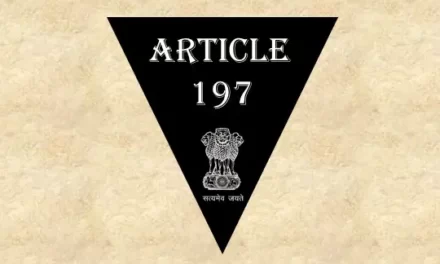
![Article 140 Explained in Hindi [अनुच्छेद 140]](https://wonderhindi.com/wp-content/uploads/2023/06/Slide150-440x264.webp)


